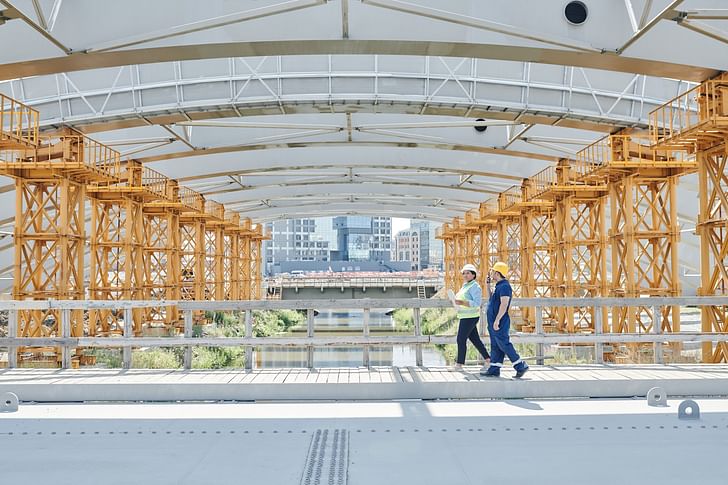

A forensic architect holds many responsibilities within the development of a construction project. Skilled in conducting investigations to identify and mitigate potential dangers or risks associated with building damage, such as construction defects, these professionals offer a bias-free, third-party perspective and solutions to a firm’s most significant construction and design deficiencies.
For our 12th installment of Archinect's Guide to Job Titles, we explore the role of a Forensic Architect and look at some of the qualifications and duties associated with this position. We will also take a closer look at the valuable contributions a Forensic Architect brings to a design team.
The role of a forensic architect comes into play when a design team is unable to come to a consensus about the source or means of a solution to a construction problem. During a project, a forensic architect may assist during design development and construction administration, or they may offer their expertise after a building has been constructed and may even be occupied post-construction. Sometimes, these professionals are hired as construction administrators who independently oversee a project. The services of a Forensic Architect depend on a project's current design phase or building condition at the time of their contribution.
Most forensic architect positions require a Bachelors's and/or Masters's degree in architecture as a core requirement. In addition, an eligible candidate might possess the following skills and qualifications:
An active architectural or professional engineer license
Be well-versed with residential (IRC), commercial (IBC), and existing (IBED) I-codes
Prior experience in Forensic Architecture or previous work as a Forensic Architect
Prior experience in the Architecture Industry
NCARB accreditation
Strong knowledge of building envelope fundamentals–the role of water-resistant barriers, flashing, climate specificities, etc.
Knowledge or experience working with construction documents, contracts, ASIs, RFIs, Contractor Requests for Payments, Punch Lists, Substantial Completion forms, etc.
Understanding of roles and individuals involved in the construction process
Strong analytical skills
Good communication and presentation skills
The specific duties of a Forensic Architect can vary. For example, these individuals may be responsible for completing building investigations, reviewing construction documents, conducting building code research, completing structure failure analysis, or completing report write-ups detailing the specificities of a building's performance and deficiencies.
Some specific tasks that may appear on a job description for a Forensic Architect role may include:
The completion of forensic field inspections
The evaluation of building code compliance
The reviewal of construction/project plan documents
The development of investigative reports highlighting key problem findings and means of remediation
During the design and construction phase of a project, firms may turn to a forensic architect to help assess issues or construction problems that may take place during a project. Their role and expertise can help mitigate finger blaming during a project and help prevent false or biased accusations. In addition, a forensic architect offers valuable feedback regarding problem resolution, design and construction issues, or code violations.
The advice and input from a forensic architect leads to resolved conflicts uncovered during a project's building process from an external standpoint to help with unnecessary project delays, lawsuits, income loss, and overall protection against human rights violators. A forensic architect's role is to deliver a durable and productive solution before things get out of hand.
New York-based practice, Howard L. Zimmerman Architects is currently seeking a Forensic Investigation Project Manager to join their team. The candidate will manage multiple forensic investigation and physical condition assessment projects as well as maintain overall project management responsibility roles. The firm shares the following responsibilities:
A Forensic Investigation Project Manager manages forensic investigation and physical conditions assessment projects, manages multiple projects at a time, and has overall project management responsibility; including client relationships, scheduling, budgeting, and profitability for a variety of projects. They are competent in all conventional aspects of architecture and perform work requiring independent judgment in evaluation, selection and adaptation/modification of standard techniques, procedures and criteria.
*It's also noted that this candidate must have 8+ years of experience.
As we can see, this particular role involves detailed field investigation, experience, and expertise in construction methods and the use of core construction principles and regulations affiliated with the region(s) they will be working in. Additionally, while working as a Forensic Architect, an individual may gain a specific construction project area–exposure to various project types, complexities, and durations serves as the preparation for narrowing to a niche area of specialization.
Equipped with many skills, a Forensic Architect needs to possess the eye of a designer, the mind of a scientist, and the inquisitorial nature of an investigator. The end goal of these skilled individuals is to mitigate loss, uncover the truth behind a design problem, and provide a viable solution.
Are you searching for a job?
Check out current opportunities available on Archinect Jobs ↗
____
American Institute of Architects, and Sharon Lobo. “‘The Role of Architects in Damage Assessment and Restoration.’” Essay. In The Architect's Handbook of Professional Practice, Fifteenth Editioned. Hoboken, NJ: John Wiley & Sons Inc, 2014.
Quigley, Kenneth R. “Why Hire a Forensic Architect?” Construction Consulting Associates. Accessed June 1, 2022. https://www.ccaco.com/blog/why-hire-a-forensic-architect.
Based in New York City, Maria is a Master of Architecture student at Columbia University. An Avid reader, Maria's favorite genres are Philosophical Fiction/Non-Fiction, Sci-Fi, Psychological Non-Fiction, and she always enjoys a good Classic. Her favorite writer is Fyodor Dostoevsky. Maria ...
No Comments
Block this user
Are you sure you want to block this user and hide all related comments throughout the site?
Archinect
This is your first comment on Archinect. Your comment will be visible once approved.